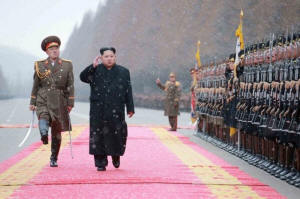|
 U.S.
rejected North Korea peace talks offer before last nuclear test: State
Department U.S.
rejected North Korea peace talks offer before last nuclear test: State
Department
 Send a link to a friend
Send a link to a friend
[February 22, 2016]
WASHINGTON (Reuters) - The United
States rejected a North Korean proposal to discuss a peace treaty to
formally end the Korean War because it did not address denuclearization
on the peninsula, the State Department said on Sunday.
|
|
 State Department spokesman John Kirby made the comment in response
to a Wall Street Journal report that the White House secretly agreed
to peace talks just before Pyongyang's latest nuclear bomb test. State Department spokesman John Kirby made the comment in response
to a Wall Street Journal report that the White House secretly agreed
to peace talks just before Pyongyang's latest nuclear bomb test.
The newspaper, citing U.S. officials familiar with the events, said
the Obama administration dropped its condition that Pyongyang take
steps to curtail its nuclear arsenal before any peace talks take
place, instead calling for North Korea's atomic weapons program to
be just one part of the discussion.
Pyongyang declined the proposal, and its Jan. 6 nuclear test ended
the diplomatic plans, the newspaper reported.
"To be clear, it was the North Koreans who proposed discussing a
peace treaty," Kirby said in an emailed statement.
 "We carefully considered their proposal, and made clear that
denuclearization had to be part of any such discussion. The North
rejected our response," he said. "Our response to the NK proposal
was consistent with our longstanding focus on denuclearization."
The isolated state has long sought a peace treaty with the United
States and other parties in the 1950-53 Korean War, as well as an
end to military exercises by South Korea and the United States,
which has about 28,500 troops based in South Korea.
North Korea said on Jan. 6 it had tested a nuclear device it claimed
was a hydrogen bomb, provoking condemnation from its neighbors and
the United States. Weeks later, it launched a long-range rocket
carrying what it called a satellite, prompting renewed criticism.
[to top of second column] |

On Jan. 16, Pyongyang had demanded the conclusion of a peace treaty
with the United States and a halt to U.S. military exercises with
South Korea to end its nuclear tests.
But U.S. Deputy Secretary of State Antony Blinken said then that
Pyongyang needed to demonstrate by its actions that it was serious
about denuclearization before any dialogues could start.
The Korean War ended in 1953 in an armistice, not a peace treaty,
signed by the United States, representing United Nations forces; the
North Korean military and the Chinese army.
Now North Korea wants those three sides and South Korea to sign a
treaty.
(Reporting by Megan Cassella and Doina Chiacu; Editing by Jonathan
Oatis)
[© 2016 Thomson Reuters. All rights
reserved.]
Copyright 2016 Reuters. All rights reserved. This material may not be published,
broadcast, rewritten or redistributed.
 |